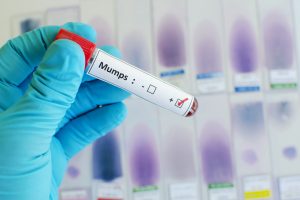
Dover Dr. Vibha Sanwal[/caption] – Vibha Sanwal, MD, from Rainbow Pediatrics of Georgetown & Lewes, has been named a Centers for Disease Control and Prevention (CDC) Childhood Immunization Champion for her outstanding efforts to promote childhood immunizations in her clinic offices. The Division of Public Health’s (DPH) Immunization Program nominated the pediatrician for the award.
Dr. Sanwal is recognized for embracing the Assessment, Feedback, Incentive & eXchange (AFIX) assessment process by reviewing patient charts against the Immunization Information System (IIS) and updating individual immunization records as patients came in during their scheduled office visits. Her clinic staff also reviewed their patient roster to ensure that the roster in the IIS matched the patient roster in their Electronic Medical Record (EMR) system. This process enables the IIS to reflect her clinic’s true coverage rates for all the vaccine-preventable diseases and provides a roadmap to ensure all her patients get each of the vaccines needed to stay healthy.
“Through the Childhood Immunization Champion awards, CDC and Delaware proudly acknowledge Dr. Sanwal’s passion, hard work and commitment to children’s health by working to eliminate vaccine preventable diseases in our state,” said DPH Director Dr. Karyl Rattay.
“I am honored to be recognized as the Immunization Champion for Delaware,” Dr. Sanwal said. “Vaccinations prevent disease and reduce suffering, improve our quality of life, and help our children live long, fulfilling lives. We will continue to work hard to improve the immunization rate of our population at Rainbow Pediatrics.”
National Infant Immunization Week (NIIW), April 21 to 28, 2018, is an annual observance to highlight the importance of protecting infants from vaccine-preventable diseases and to celebrate the achievements of immunization programs in promoting healthy communities throughout the United States. Each year during NIIW, the CDC Foundation honors health professionals and community leaders from around the country with the CDC Childhood Immunization Champion awards. These awards acknowledge the outstanding efforts of those individuals who strive to ensure that children in their communities are fully immunized against 14 preventable diseases before the age of two.
“The tremendous success of CDC’s immunization programs to protect the nation’s children from vaccine-preventable diseases is a direct result of the efforts of childhood immunization champions,” said Dr. Nancy Messonnier, Director of the National Center for Immunization and Respiratory Diseases at the CDC. “We cannot overstate the value of the dedication our Champions have shown, which ultimately protects our children, schools, and communities from serious diseases.”
CDC Childhood Immunization Champions were selected from a pool of health professionals, coalition members, community advocates and other immunization leaders. State Immunization Programs coordinated the nomination process and submitted nominees to CDC. One winner was selected in each of the 50 participating states and the District of Columbia.
For profiles of other CDC Childhood Immunization Champion award winners, visit https://www.cdc.gov/vaccines/champions.
For information on immunization schedules for infants and children, visit: http://www.dhss.delaware.gov/dph/dpc/immunize-children.html.
A person who is deaf, hard-of-hearing, deaf-blind or speech-disabled can call the DPH phone number above by using TTY services. Dial 7-1-1 or 800-232-5460 to type your conversation to a relay operator, who reads your conversation to a hearing person at DPH. The relay operator types the hearing person’s spoken words back to the TTY user. To learn more about TTY availability in Delaware, visit http://delawarerelay.com.
Delaware Health and Social Services is committed to improving the quality of the lives of Delaware’s citizens by promoting health and well-being, fostering self-sufficiency, and protecting vulnerable populations. DPH, a division of DHSS, urges Delawareans to make healthier choices with the 5-2-1 Almost None campaign: eat 5 or more fruits and vegetables each day, have no more than 2 hours of recreational screen time each day (includes TV, computer, gaming), get 1 or more hours of physical activity each day, and drink almost no sugary beverages.
 9. At least 11 of the 19 persons with mumps attended either the Feb. 10, or March 3, 2018, social dance (Baile Mexicano) that took place at the Chase Center on the Riverfront in Wilmington. All 19 individuals reside in New Castle County. The age ranges of adults with the mumps virus are 21 to 57 years old. Additionally, there was one child under the age of 5 infected.
9. At least 11 of the 19 persons with mumps attended either the Feb. 10, or March 3, 2018, social dance (Baile Mexicano) that took place at the Chase Center on the Riverfront in Wilmington. All 19 individuals reside in New Castle County. The age ranges of adults with the mumps virus are 21 to 57 years old. Additionally, there was one child under the age of 5 infected.